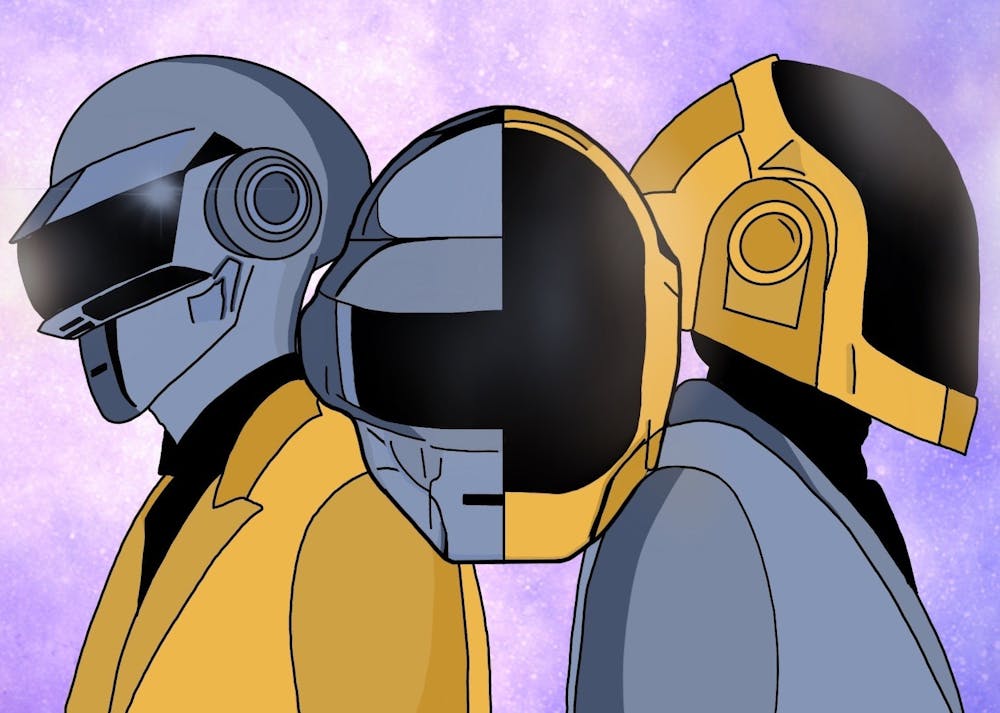After 28 years, four studio albums, six Grammy Awards and legions of fans around the world, Daft Punk is no more.
The legendary French electronic music duo of Thomas Bangalter and Guy-Manuel de Homem-Christo officially announced their decision to break up in an almost eight-minute clip from their 2006 film “Electroma.”
To say the music world is saddened by this split is an understatement.
If you have ever been out to a club or casually listened to the radio, chances are you've encountered Daft Punk. Their unique blend of house music, techno and rock along with elements of disco and funk dominated radio stations and dance parties for years.
From early hits like “Around the World,” “Da Funk,” “One More Time,” and “Digital Love,” to the more recent classics like “Get Lucky,” as well as collaborations with artists like The Weeknd, the group's epic synth-infused club bangers and propensity for genre-bending cemented them as a titan of the music industry.
Decked out in their iconic robot costumes and armed with their unparalleled passion for music, Daft Punk managed to influence generations of musicians, from Janet Jackson to Kanye West.
But for me, they were more than just a really good band.
Anyone who has known me for an extended period of time knows my love for the robotic duo goes way back.
I was first exposed to the group's music when I was around 9 years old, stumbling upon a video containing the hit single “Harder, Better, Faster, Stronger.” The repetitive lyrics and infectious beats worked their way into my brain and stuck with me for years.
Daft Punk's music served as the soundtrack of my nerdy upbringing, from the dance club sensibility of the debut album “Homework,” to the electronic-infused pop anthems of “Discovery,” and even the dirty rock stylings of “Human After All."
Growing up, I never connected with any of the music my peers listened to. As cliché as it sounds, pop music at the time just didn’t interest me, and when everyone else clung to artists they loved, I was left having no way to connect when it came to musical taste.
Until I discovered Daft Punk.
I was one of very few kids I knew who were even aware of Daft Punk’s existence, but when I did find others who also loved their music, the bond between us would lead to some of my longest-lasting friendships.
Over the years, Daft Punk cemented themselves as household names. The group's collaborations with other artists brought greater recognition. Plus, who could forget their incredible work on the soundtrack for the 2010 film “Tron: Legacy,” which blended their iconic sound with epic orchestration to create what I’d consider to be one of the greatest film scores of all time?
But it was their hit song “Get Lucky,” made in collaboration with Pharrell Williams and Nile Rodgers, that dominated the charts in 2013. The song along with their fourth and final studio album, “Random Access Memories,” seemed to usher in a new era of Daft Punk. Despite speculation about a new tour and album, nothing came, leaving fans eager for updates.
After eight years since the release of "Random Access Memories" and very little aside from two collaborations with The Weeknd and some producing here and there, fans got what they had always feared — the end of Daft Punk.
Trying to understand just what makes Daft Punk so iconic is a rabbit hole all on its own. The duo was an enigmatic mess of contradictions.
You’d think a group characterized by its silent, robotic personas would produce heartless dance music, but at no point was that ever the case. Despite their cold appearances, Daft Punk's music possessed a sense of passion and love few artists are able to replicate.
Even when their lyrics seemed dumb and repetitive, listeners could always tell how deeply the duo cared about its art, being perfectionists of the highest variety with no two albums ever sounding the same. Up until the end, Daft Punk were constantly evolving their sound, innovating and inspiring with every new song crafted.
Saying goodbye to Daft Punk hurts. In the hours following the announcement, I re-listened to the group's best hits, reconnected with old friends to share memories and shed tears at the knowledge we won’t have any more albums to look forward to.
Yet, in all of the sadness, I can’t help but feel unbelievably proud to have grown up with Daft Punk's music.
The soundtrack of my childhood has come to an end, and I suppose it’s time to grow up. But I’ll never forget the joy and sense of belonging I felt whenever their music played at a party or school dance.
All I can say is thank you. Thank you for everything, Daft Punk. Even with your robotic exteriors, your music showed us what it means to be "human after all."
Reach the reporter at nmdelga3@asu.edu and follow @DelGoada on Twitter.
Like The State Press on Facebook and follow @statepress on Twitter.
Continue supporting student journalism and donate to The State Press today.




